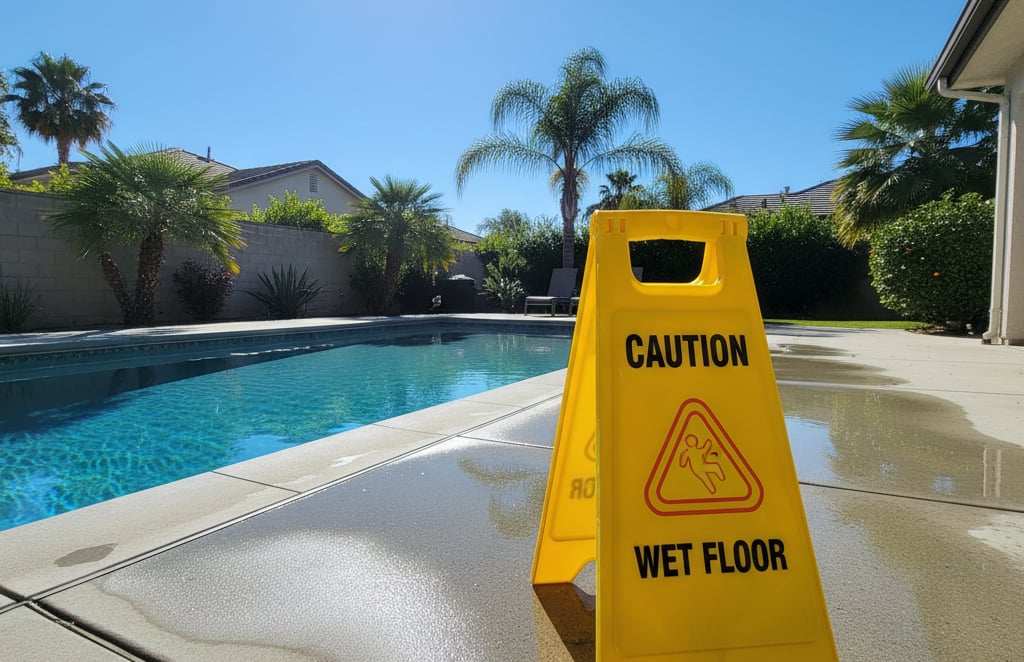Swimming Pool Slip Cases: Proving Negligence

A sunny day by the pool can turn tragic in seconds. Whether it’s a quick dip, a family barbecue, or a neighborhood pool party, swimming pool accidents are more common than many realize. In California, where pools are a staple of backyard living, slip and fall injuries around swimming pools account for thousands of emergency department visits each year.
While some incidents are purely accidental, many happen because of unsafe conditions, poor maintenance, or a property owner’s negligence. Understanding your rights under California premises liability law is essential if you or a loved one suffers an injury in or around a pool.
How Swimming Pool Slip Accidents Happen
Swimming pools present unique risks. Surfaces around the pool—concrete, tile, or stone—are often wet and slippery, especially during parties or after cleaning. When property owners fail to maintain the area or follow pool safety standards, the risk of a serious accident increases.
Common causes of swimming pool slip and fall injuries include:
- Slippery surfaces with no anti-slip mats or grip materials
- Broken tiles or uneven walkways near the pool area
- Poor lighting around steps or decks
- Leaking pool equipment creating puddles
- Lack of warning signs near wet surfaces
- Inadequate supervision of guests or children
- Poor maintenance of pool equipment and drains
Even a simple backyard pool party can become dangerous if the host ignores basic safety measures or fails to warn guests about known hazards.
Understanding Property Owner Liability in Pool Accidents
Under California law, anyone who owns or controls a property has a duty of care to keep it in a reasonably safe condition. This includes maintaining home swimming pools, public swimming pools, and apartment complex pools in ways that prevent foreseeable injuries.
If a guest, visitor, or even a trespassing child is injured because of unsafe conditions, the property owner may be held responsible through a premises liability claim.
To succeed in such a case, the injured party (plaintiff) must prove:
- The property owner owed a duty of care.
- The owner breached that duty by creating or failing to correct an unsafe condition.
- That breach directly caused the injury.
- The injured person suffered damages, such as medical bills, lost wages, or pain and suffering.
This legal framework applies whether the injury occurs at a private residence, a hotel pool, or a community swimming facility.
Private Pools and Homeowner Responsibility
Most California swimming pool accidents occur in residential settings, not public ones. Homeowners often underestimate their legal exposure when they invite guests for a swim.
Even if the guest is a close friend or family member, the law still requires pool owners to maintain safe conditions. This includes:
- Ensuring surfaces are slip-resistant and properly maintained.
- Installing self-latching gates to prevent child access.
- Keeping decks clear of clutter, toys, and hoses.
- Using appropriate warning signs for wet or hazardous areas.
- Regularly inspecting pool equipment for leaks and cracks.
If a guest slips and falls on a wet surface without proper safeguards in place, the homeowner may face liability for the resulting injuries.
Fortunately, most cases are covered under homeowner’s insurance, meaning victims can seek compensation without personal financial conflict.
Public and Commercial Pool Liability
Public swimming pools—including those operated by hotels, fitness centers, and apartment complexes—must meet strict safety standards under California’s Swimming Pool Safety Act.
Operators and owners are expected to:
- Post visible warning signs near deep ends or slippery surfaces.
- Provide adequate lifeguard supervision where required.
- Maintain non-slip flooring and clean walkways regularly.
- Repair damaged steps, ladders, and handrails promptly.
- Conduct routine maintenance inspections and keep records.
When a pool operator fails to follow these rules, victims can pursue claims under premises liability and negligence law.
Unlike homeowners, commercial and public pool operators are often subject to additional state health codes and insurance regulations, increasing their responsibility to prevent unsafe conditions.
Injuries Caused by Swimming Pool Slips
Slip and fall accidents near pools can lead to severe and life-altering injuries. The hard surfaces surrounding swimming pools can cause:
- Head injuries or concussions
- Spinal cord injuries resulting in partial paralysis
- Broken bones or fractures
- Lacerations from sharp edges or broken tiles
- Dislocations and soft tissue damage
- Drowning or near-drowning incidents from loss of balance
In severe cases, these injuries may require long-term medical care, rehabilitation, and physical therapy, placing an enormous financial burden on the injured victim and their family.
The Attractive Nuisance Doctrine
Under California’s attractive nuisance doctrine, property owners can be held liable if a child is injured after being drawn to an appealing but dangerous feature—like a backyard pool—even if the child was not invited.
Pool owners must take reasonable steps to prevent unsupervised access by minors, such as:
- Installing secure fencing and gates
- Using pool covers when not in use
- Ensuring alarms and locks are functional
Failure to do so could make the owner legally responsible if a child is hurt or drowns, even if the owner was unaware the child entered the property.
Proving Negligence in Pool Slip Cases
Proving negligence in a swimming pool accident often requires strong evidence. An experienced personal injury attorney can gather and present the facts needed to hold the negligent property owner accountable.
Key evidence includes:
- Photos and videos of the accident scene showing wet surfaces, missing signage, or poor lighting
- Maintenance records and inspection logs from the pool operator
- Witness statements from guests or neighbors
- Medical records documenting injuries and treatment
- Evidence of poor maintenance or code violations
In some cases, experts in pool safety or engineering may testify about slippery surfaces or improper drainage, helping establish that the property owner’s negligence caused the accident.
Compensation for Pool Accident Victims
Victims of swimming pool accident injuries can pursue compensation for both economic and non-economic losses. Depending on the circumstances, compensation may cover:
- Medical expenses and ongoing rehabilitation costs
- Lost wages or reduced earning capacity
- Pain and suffering
- Emotional distress
- Property damage (such as ruined clothing or devices)
In tragic cases involving fatalities, surviving family members may also file a wrongful death claim to recover financial compensation for funeral costs, lost income, and emotional loss.
Steps to Take After a Swimming Pool Slip
If you’ve been injured in a pool accident, taking the right steps immediately can strengthen your claim:
- Seek medical attention right away to document your injuries.
- Report the incident to the property owner or pool operator.
- Take photos of the scene and your injuries.
- Collect contact information for witnesses.
- Avoid speaking to insurance adjusters without legal advice.
- Consult a personal injury lawyer familiar with California swimming pool accidents.
The sooner you contact legal counsel, the better your chances of preserving critical evidence and protecting your rights.
How Harker Injury Law Can Help
Proving negligence in swimming pool slip cases can be challenging. Property owners and insurance companies often argue that victims were careless or that the hazard was “obvious.” That’s why having a skilled legal advocate makes a difference.
At Harker Injury Law, our team investigates every detail—from maintenance records and pool design to witness interviews and safety compliance. We build strong, evidence-based claims to hold property owners and pool operators accountable.
Our attorneys understand California premises liability law and have helped many injured victims secure full and fair compensation after swimming pool accidents.
Call for Legal Help Before Evidence Disappears
If you were hurt because a pool owner or operator failed to keep the area safe, don’t wait to get help. Evidence can wash away—literally—after cleanup or repairs.
Call Harker Injury Law today at 760-INJURED (760-465-8733) for a free legal consultation. Our team will review your case, explain your legal options, and fight to secure the financial compensation you deserve.
We know that swimming pool accidents can leave lasting scars—physically, emotionally, and financially. Let our personal injury lawyers help you focus on recovery while we handle the rest.










